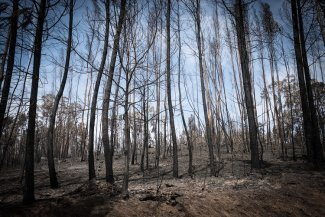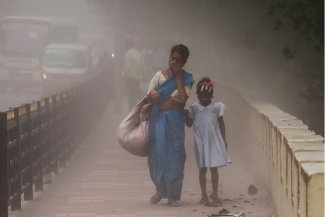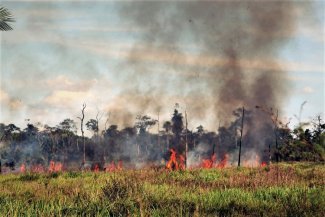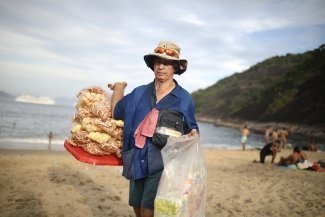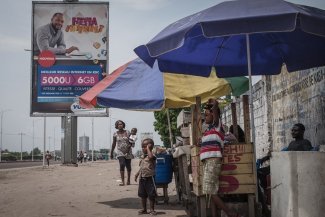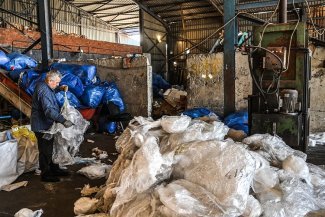
Sapfo Papatheodorou, the owner of a riding school, poses with one of her horses on her ranch on the island of Evia in June 2023. Damage from the devastating 2021 fire, which upended Papatheodorou’s business, can be seen in the background.
The road that leads to Paralia Vasilikon, a small village in the north-east of the Greek island of Evia, 80 kilometres east of Athens, resembles scenes from the apocalypse. Charred trees, burnt and abandoned shelters, and barely legible road signs are a ubiquitous sight. It’s been two years since a major fire burned across the island and its scars are still very much visible.
Sapfo Papatheodorou grew up here on a small ranch on the outskirts of the village, nestled between the sea and the mountains. She rode horses in the forest and led a simple and idyllic life on the island, which remains untouched by mass tourism. On the night of 6 August 2021, however, that dream turned into a nightmare.
More than 50,000 hectares of woodland – almost 15 per cent of the island’s surface area – burned over the course of ten days. The fire swept through village after village, from one side of the island to the other, taking both residents and tourists by surprise. Hundreds of animals lost their lives, while houses, olive groves and beehives were burnt to the ground. Papatheodorou had a front row seat.
“It was the middle of the night and I found myself surrounded by flames. I got some water and immediately tried to wet as much earth as possible around my house to protect it. I was burned on my legs and arms but we managed to beat back the fire with the help of volunteers.”
Papatheodorou says she received no help from the fire brigade during her long battle against the flames, even though she could see them close to the blaze. “They could have stopped the fire but they did nothing, really nothing at all. When you see a fireman sitting next to you watching a fire and doing absolutely nothing, it’s shocking! They betrayed us,” says a still angry Papatheodorou.
Greek journalist Daphné Tolis, who covered the event, heard similar sentiments of anger with authorities from one end of the island to the other.
“The fire brigade was ordered to evacuate everyone and not to save houses. They were told only to intervene when lives were in danger. I remember one lady who had to leave behind all her animals, and they burned. It was tragic.”
As Tolis explains, several fires were then raging simultaneously in the country, including one on the outskirts of Athens, to which a large proportion of emergency and fire-fighting resources had already been devoted. This also contributed to feelings of abandonment in Evia. A few days later, Prime Minister Kyriakos Mitsotakis was even forced to apologise, promising that lessons would be learned.
But Papatheodorou still feels completely abandoned by the authorities. She believes that too little has been done over the last two years and that the measures taken by the government, including compensation pay for victims, have been insufficient. “Immediately after the fire and still to this day, we have had no one to rely on but each other. But to rebuild we need help from the government. Where is it?” she asks.
Surviving through solidarity
Katerina Kaltsa, who lives in the north of Evia, was also surprised by the scale of the fires in 2021. But even in the face of danger, she didn’t hesitate for a moment to open the doors of her café-bar. “Everything happened so fast, we were in survival mode and solidarity came naturally. At times like that, you don’t think about the business, the shop or the tourists, all you think about is getting through the ordeal and helping other people.” She provided shelter and food to the fire brigade over the first few days of the fire. Her generosity was relayed on social media and led to an outpouring of donations.
“The response was so massive, we had to rent a storage space. We received things from all four corners of the country, from clothes to food and medicine,” she recalls. As the fire grew, many residents took refuge on the beach in front of her business.
“We stayed there to help for ten days. We couldn’t breathe, but we couldn’t leave. Helping each other became natural, it was the only thing we could do as human beings”.
A few kilometres away, Deppie Kourellou and her sister tried to prepare a rescue plan in advance, fearing that the authorities would not be able to help them. “We hired a large container for our horses and donkeys but it broke when it arrived. We had no choice but to rush to the beach with our animals, thanks to the help of friends,” says Kourellou, who still has nightmares about that terrible night.
Once they were on the beach, the smoke became more and more imposing and caused her horses to flee for several hours. She eventually found them safe and sound. Her ranch, however, had burnt to the ground.
But in the midst of that nightmare, she also remembers the extraordinary solidarity that came to their aid. “I still get shivers thinking about all the people who gave up their holidays all over Greece to come and help us. There has always been solidarity between people here but it was incredible to see that.”
Thanks to volunteers and numerous donations, she and her sister have since been able to rebuild their ranch and resume their business. But they still carry a lot of anger with them. “We feel abandoned and forgotten. To this day, no one from the government has come to see what really happened here. We’ve been left on our own to rebuild our lives. Fortunately, there has been a lot of mutual aid.” When contacted for further details, neither the Ministry of Civil Protection nor the fire service responded to requests for interviews.
Looking towards the future
Since the terrible fire, clean-up work has been undertaken to remove charred trees, help with reforestation and prevent soil erosion. But this will take time. According to the World Wildlife Fund (WWF), it will take between 20 and 25 years for the forest to return to its former state. Returning to normal life hasn’t been easy for residents either, and the uncertainty that locals feel is palpable.
“Many of the tourists who used to come here don’t want to come any more. They don’t want to see this disaster. I understand them; they have to drive for an hour through a black forest. It’s quite depressing,” says Papatheodorou, whose income depends on tourism.
Despite the €150 vouchers introduced by the government for Greeks visiting the region after the fire, Papatheodorou has had few visitors, which has jeopardised her business. Like many regions in Greece, tourism is a major economic driver on the island and is essential. On a national scale, it accounts for almost a quarter of gross domestic product (GDP).
Faced with the prospect of a bleak future for the island, Papatheodorou is uncertain of her own future. “I want to stay here and see Evia turn green again but sometimes it’s too hard. I don’t know if I really have the strength to stay here.”
Every year, Greece has to contend with fires of varying intensity throughout its territory. These can also be very deadly, as in 2018, when around 100 people died, mainly in Attica. This phenomenon is becoming more pronounced as a result of the Mediterranean country’s increasing vulnerability to climate upheaval (drought, rising temperatures). After yet another dramatic summer in 2021, the centre-right government began to take these issues seriously and created a new ministry of climate crisis and civil protection. This year, the country has been facing an intense heat wave since mid-July and, like every summer, several dozen outbreaks of fire are threatening local populations and tourists alike.
In 2022, the ministry recorded a 3.1 per cent increase in the number of fires compared with the period between 2007 and 2021. Fears for the summer of 2023 and beyond are high, as record temperatures continue to be registered around the world. According to a study by the University of Thessaloniki on the consequences of global warming, the mercury could soon reach 50°C in Greece in the summer.
Greece, still suffering the effects of years of austerity and now reeling from a post-pandemic and inflationary economic crisis, is hard pressed for resources to deal with the increasing risk of fire.
“The question of resources for fire-fighting is still being debated in Greece. Since the crisis, very few firefighters are paid on a year-round basis, as there is no real work in winter and it’s too expensive to pay them to do nothing,” explains journalist Daphné Tolis, whose reports clearly show that resources are not commensurate with the growing risks.
This summer, however, Greece will once again be able to count on 200 firefighters from six EU countries who will be deployed through the EU’s civil protection mechanism, which is designed to lend a hand to member states during and in anticipation of crisis situations.
Efforts focused on fire prevention have also been criticised as insufficient. According to a recent report published by the WWF, 83.5 per cent of Greek public funds for fire protection between 2016 and 2020 were devoted to fighting forest fires, and only 16.5 per cent to preventing them. The United Nations, however, recommends investing 45 per cent in fire prevention, 35 per cent in fire-fighting and 20 per cent in reforestation.
Ever since the fire, Deppie Kourellou and her sister have felt less safe and want to be better prepared. “What can we do if there’s another fire? We don’t have large vehicles, water or expertise. That’s why we decided to train as volunteer firefighters”. Kourellou, like many others, is keeping solidarity alive on the island.



